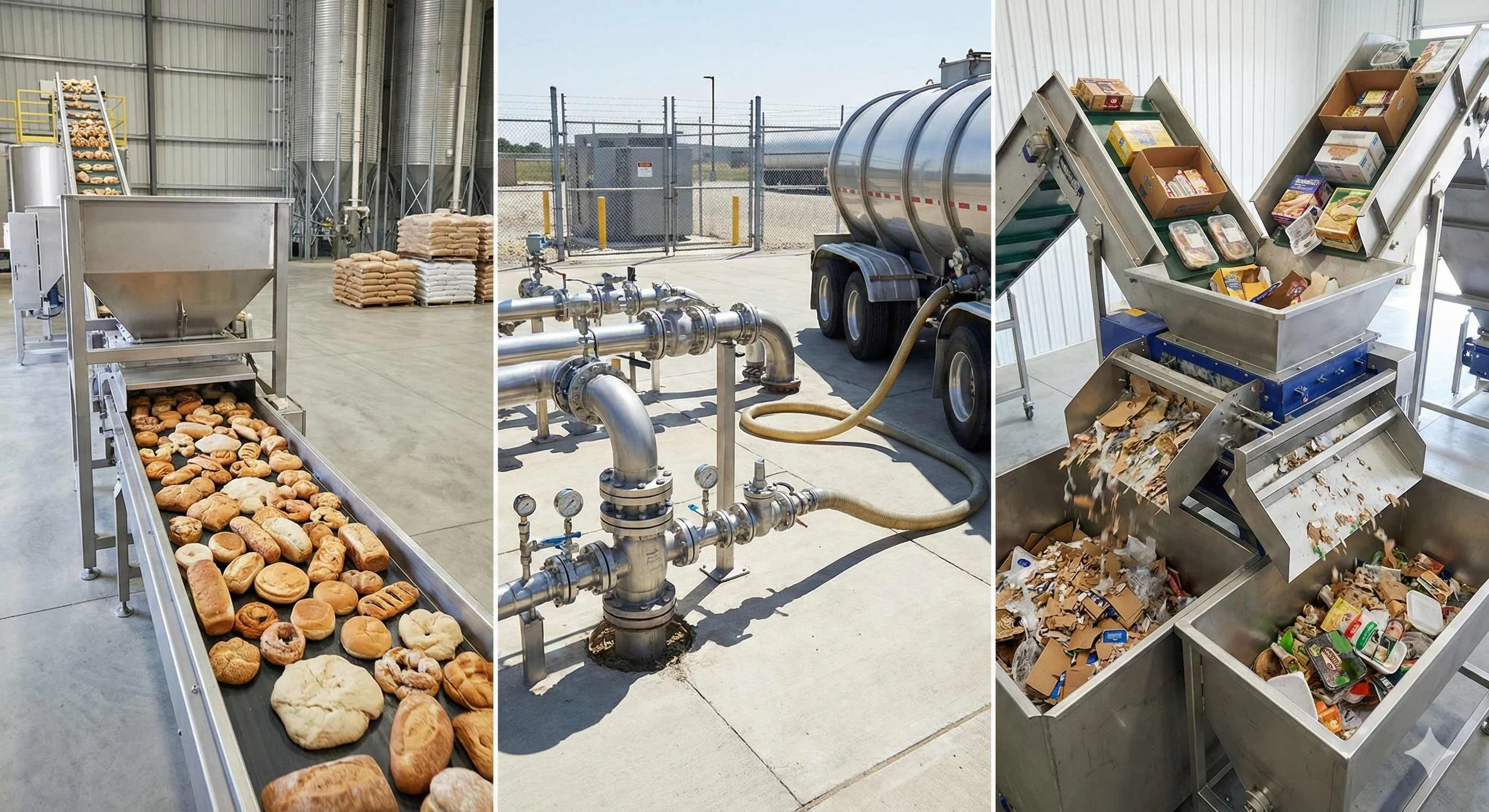Industrial Organics & Food Byproduct Management
Reduce disposal costs by diverting bulk food waste, processing sludge, and packaged goods from landfills. We connect industrial generators with depackaging, composting, and animal feed partners nationwide.

Organic Streams We Work With
| Waste Stream | Typical Format | Diversion Solution |
|---|---|---|
| Packaged Food / Bev | Palletized Cans, Bottles, Boxed Goods | Depackaging (Separation & Recovery) |
| High-Energy Byproducts | Bakery Waste, Dough, Fats/Oils | Animal Feed Ingredients |
| Liquid Organic Waste | Tanker Loads, Slurries, DAF Sludge | Anaerobic Digestion (Biogas) |
| Bulk Green Waste | Vegetable Trimmings, Husks, Pulp | Industrial Composting |
Specialized Organic Waste Solutions
Processed Food & Bakery Feedstock
For high-calorie byproducts like dough, bread, and sugary ingredients, we can often route material to animal feed producers. This is often the most cost-effective diversion method available. View Feedstock Solutions ->
High-Strength Wastewater Offtake (Injection)
For high-volume, liquid-phase streams (like whey permeate, corn wash, or sugary rinse water) facing steep municipal surcharges, we utilize Class I injection wells and industrial bio-systems. This creates a high-capacity outlet for fluids that are too potent for city sewers but too clean for sludge handling. View Liquid Logistics ->
Depackaging & Destruction
We manage off-spec, expired, or recalled packaged goods. Our partners utilize mechanical depackaging technology to separate packaging (for recycling/disposal) from the organic content (for energy or compost), ensuring total brand protection. View Cold Storage Solutions ->
Bulk Liquid & Sludge Management
We coordinate vacuum tankers and transport for liquid food waste and wastewater sludge, directing flows to anaerobic digesters for renewable energy generation or land application.
The Economics of Organics Diversion
Organic waste is heavy, wet, and expensive to landfill. Waste Optima helps you lower your Total Cost of Disposal by finding specialized outlets.
Cheaper Tipping Fees: Composting and Anaerobic Digestion facilities typically offer lower gate rates than Subtitle D landfills.
Reduced Hauling Frequency: By utilizing compactors or liquid tankers efficiently, we optimize payload weight.
Sustainability Credits: We provide diversion reports verifying that your material was recycled, not landfilled, supporting your Zero-Waste goals.
Organic Waste FAQs
Do you accept packaged food waste (e.g., pallets of expired milk or canned goods)?
Yes. We work with facilities equipped with depackaging technology that mechanically separates the organic material from the plastic, metal, or cardboard packaging. This allows you to dispose of full pallets without manual labor.
Can you handle liquid food waste?
Yes. We coordinate vacuum tankers for pumpable liquids, slurries, and fats/oils/grease (FOG). These are typically diverted to anaerobic digesters for energy recovery.
Is there a minimum volume requirement?
We primarily serve industrial generators requiring full truckload service (Dump Trailer, Tanker, or 53' Dry Van). We generally cannot service small restaurant or cafeteria routes.
Does this save money compared to landfilling?
In most regions, yes. Because organic waste is heavy, landfill tipping fees add up quickly. Specialized organic outlets often have lower gate rates, creating a net savings even after transportation costs.
Last updated: 2025-12-30
Stop Paying High Landfill Rates for Organic Waste
If you are sending heavy, wet organic material to the dump, you are likely overpaying for disposal. Let us audit your stream to find a lower-cost, sustainable outlet in our network.
